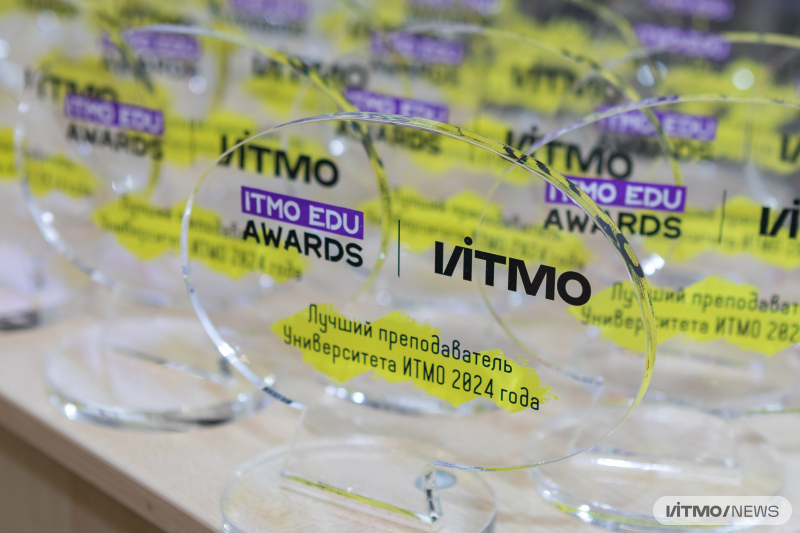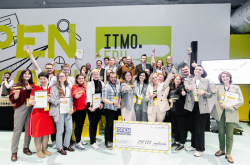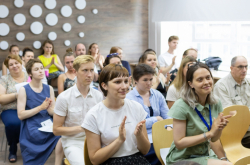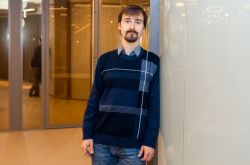Projects were submitted within eight categories: Gamified Education and Gamification; Evaluation System; Online Education; Pedagogical Management; Educational Initiative; Active Learning; Project Work; and Digital Solution for Education. An additional track, AI in Education, was designed specifically for AI-related projects. The competition was open for fledgling and experienced lecturers from ITMO and other universities. From a total of 39 submitted applications, 12 projects proceeded to the finals.
All projects were evaluated by an expert board featuring ITMO deans and deputy deans, previous years’ winners, as well as a guest expert, Anastasia Andreeva, the head of the Laboratory for Innovations in Education at HSE University and the program director of the Competition for Innovations in Education. Among the evaluation criteria were: the problem targeted by the project, the proposed solution’s applicability, the results of the technology’s application, and the presentation.
“Each of the projects presented today was created not for the sake of the competition or to stand out, no – they were all driven by a desire to improve the education system and love for students and the vocation of an educator. I am grateful to every participant for that,” says Veronika Prokopenya, a member of the expert board and deputy dean of ITMO’s Faculty of Technological Management and Innovations.
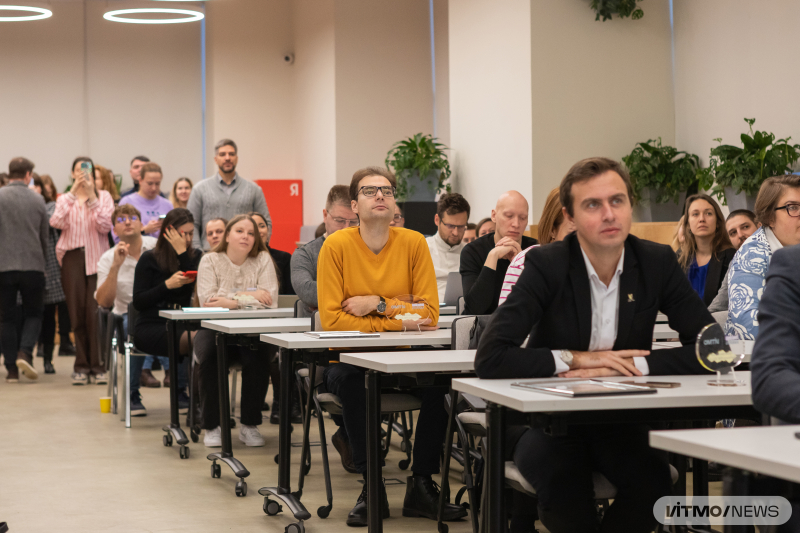
EduLeaders project defenses. Photo by Dmitry Grigoryev / ITMO.NEWS
Winning projects
The first place went to the eco-hackathon Hyperjump to Sustainable Development, created by a team from ITMO’s Faculty of Ecotechnologies: lecturers Alena Ermochenko, Ekaterina Litvinova, and Ekaterina Perevertaylova. The project introduces school students to the Sustainable Development Goals and the basics of project work, as well as helps them quickly adapt to university-level workloads and experience the typical workflow of most organizations. The hackathon was held three times, each time open to online and offline participants. Over the course of three days, students developed projects in four areas: food industry, IT, construction, and tourism. The list of partners included Beeline, Unifood, Green Zoom, and the Kronotsky Nature Reserve; the organizationsprovided real cases from their practice for the competition tasks.
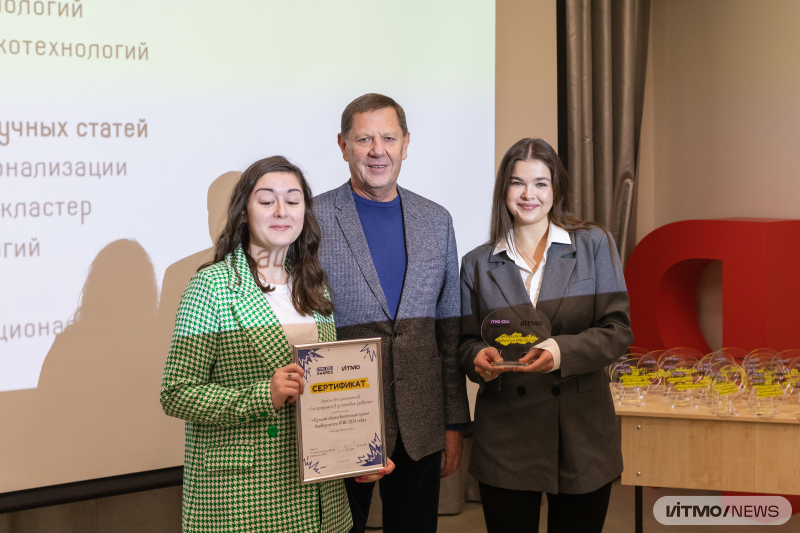
Alena Ermochenko and Ekaterina Litvinova with ITMO Rector Vladimir Vasilyev. Photo by Dmitry Grigoryev / ITMO.NEWS
In second place was the project Science Sprint: A Hackathon for Writing Research Papers, run by a team from four ITMO departments and featuring Anna Kuznetsova, Daria Gorbenko, Oleksii Peltek, Alena Ermochenko, and Maria Didkovskaia. In this hackathon, participants can quickly learn the skills needed to write scientific papers. For this purpose, participating students spend three days learning to select sources, describe their research methods, and outline their papers – with expert guidance.
Another project in the top three is the educational course Digital Storytelling created by Evgeniya Shestakova and Natalia Tikhomirova from the Institute of International Development and Partnership. In the course, students learn to apply digital tools and storytelling technologies for content creation. To maintain a balance between practice and theory during the learning process, the educators employed various methods such as online workshops, challenges on social media, short reflective essays, and various formats of online home assignments. To get the final credit in the course, students had to create a project and defend it.
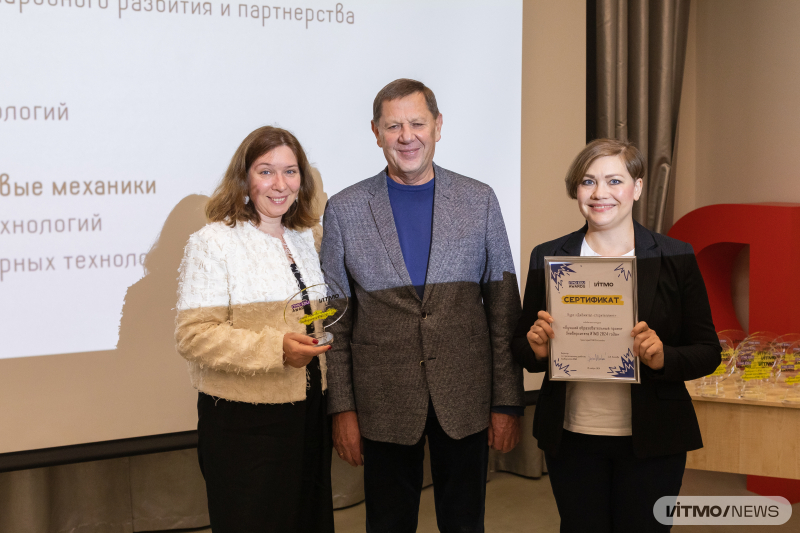
Evgeniya Shestakova and Natalia Tikhomirova with ITMO Rector Vladimir Vasilyev. Photo by Dmitry Grigoryev / ITMO.NEWS
Among the top five gamification solutions was one from Alena Ermochenko, a lecturer at the Faculty of Ecotechnologies – the game 2050: Saving the Future. By participating in the game, students complete six seminars in the course Sustainable Development Goals. In the game, students travel to the year 2050, when humanity is facing extinction. However, they have the chance to go back in time and change political decisions to prevent such an outcome. Those who can “close” all 17 SDGs win the game. Thanks to this approach, students can learn the theory and simultaneously apply it in practice, boosting their critical thinking and teamwork skills.
Another winner in gamification is Achievement Unlocked! Pinpoint Game Mechanics. Its authors Dmitry Sinev and Anastasia Bondarenko from ITMO’s Institute of Laser Technologies turn the whole educational process into a game. Students perform the same tasks they always do, but they get points for each of them – points that go towards the final grade. However, it’s unknown which activities earn points and how many points each of them is worth. Because of that, students need to pay attention to every assignment in the course, as well as come to each class on time – because that’s also taken into account by the “game master.” With this system, the creators were able to increase the attendance of the course from 49% to 78%.
These five projects were automatically nominated for the ITMO.LOVE award in the category Top Projects in Education.
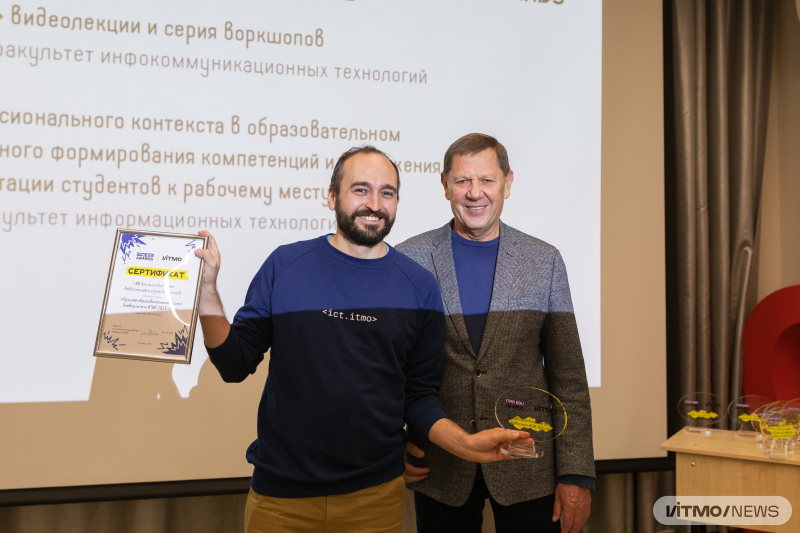
Alexandr Kapitonov with ITMO Rector Vladimir Vasilyev. Photo by Dmitry Grigoryev / ITMO.NEWS
Also among the top eight winners are: the series of video lectures and workshops AI for Research (Aleksandr Kapitonov, Faculty of Infocommunication Technologies); a training model that allows students to achieve zero adaptation time to the workplace (Andrey Sukhovitsky, Faculty of Information Technologies and Programming); and a marketing immersion technology based on a creative framework used in marketing to engage the target audience (a team from the Faculty of Technological Management and Innovations).
